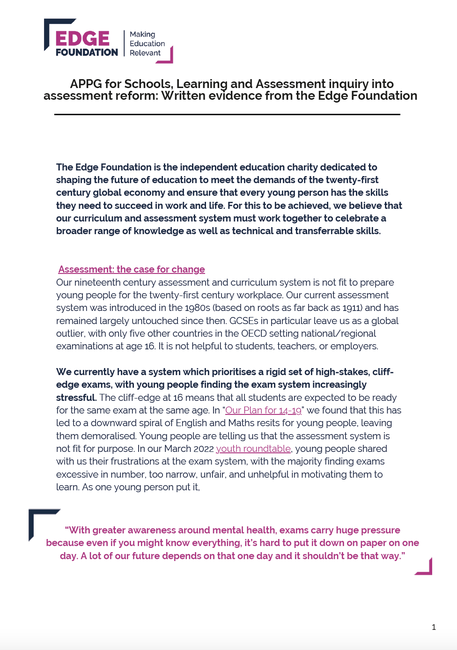At Edge, we have long been calling for our outdated curriculum and assessment system to be reformed. Many others, including the Royal Society, the Times Education Commission and our colleagues at Rethinking Assessment are calling for similar reform.
The focus on a rigid set of high-stakes, cliff-edge exams, has left young people finding the exam system increasingly stressful, as they told us out our youth roundtable with Shadow Schools Minister, Stephen Morgan last year. Exams have also forced teachers to ‘teach for the test’ rather than to cultivate a joy for learning through innovative and exciting teaching methods. As a result, 92% of teachers agreed that exams and league tables distort priorities of schools and stops educators from providing a well-rounded education, according to a poll commissioned by Edge in 2020. It is also clear that exams are not preparing young people for the world of work, as many employers have voiced concern that qualifications alone do not give enough information about the broader skillsets of potential employees. This issue was also highlighted in our recent report on learners’ perspectives on employability skills. 22.4% of learners reported that digital skills in particular were underdeveloped in schools, followed by confidence (20.2%), and creativity (17.1%). Learners also struggled to point to specific examples of how employability skills are developed within the subject-based curriculum.
That is why we have been pleased to support the APPG for Schools, Learning and Assessment, led by our colleagues at the NEU, in its work encouraging parliamentarians to re-evaluate how the current schools system prepares our young people for work and life. The APPG has launched an inquiry into assessment reform, which will look at the effect of assessment on curriculum, as well as the relationship between assessment and accountability. You can find our submission by clicking the pdf link below.
Please consider submitting your own evidence by emailing it to appg.schools@neu.org.uk by Friday 17 March. Find out more about the inquiry, including its terms of reference, on the APPG’s website here.

